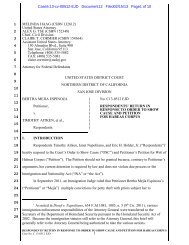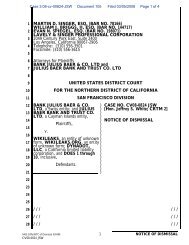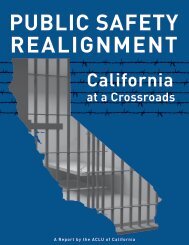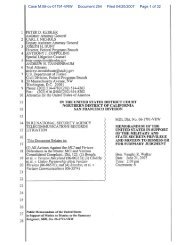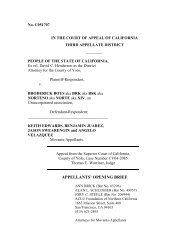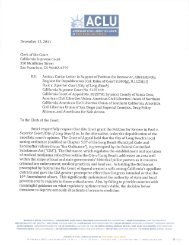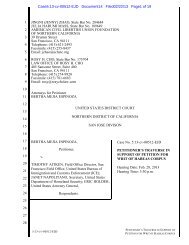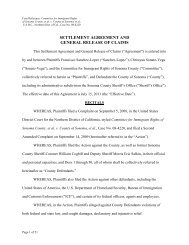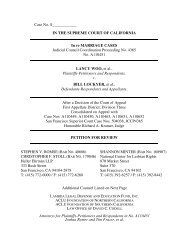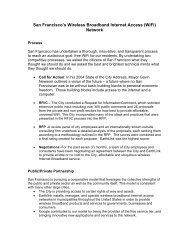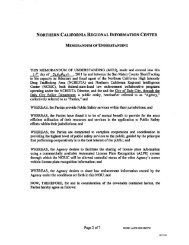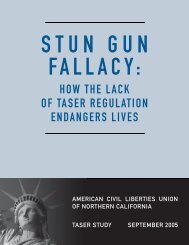file a brief - ACLU of Northern California
file a brief - ACLU of Northern California
file a brief - ACLU of Northern California
You also want an ePaper? Increase the reach of your titles
YUMPU automatically turns print PDFs into web optimized ePapers that Google loves.
1<br />
2<br />
3<br />
4<br />
5<br />
6<br />
7<br />
8<br />
9<br />
10<br />
11<br />
12<br />
13<br />
14<br />
15<br />
16<br />
17<br />
18<br />
19<br />
20<br />
21<br />
22<br />
23<br />
24<br />
25<br />
26<br />
27<br />
28<br />
permanent police records.” White, 13 Cal.3d at 768 n. 4. The constitutional interest in preserving the<br />
free flow <strong>of</strong> ideas is at least as important in this context – the internet – as in White – the university.<br />
See, e.g., Reno v. American Civil Liberties Union, 521 U.S. 844, 870 (1997) (recognizing importance<br />
<strong>of</strong> internet as forum for speech); Krinsky v. Doe, 159 Cal.App.4th 1154, 1164 (2008) (same). But the<br />
danger <strong>of</strong> chilling expressive activity through use <strong>of</strong> new technology is far greater than in White. By<br />
stockpiling ten months’ worth <strong>of</strong> communications, the government can compile far more<br />
comprehensive information about the views, associations, and habits <strong>of</strong> defendants and third parties<br />
through the subpoenas here, than it could possibly have gleaned about the pr<strong>of</strong>essors and students in<br />
White by sending police <strong>of</strong>ficers into classrooms and meetings. See also United States v. Garcia, 474<br />
F.3d 994, 998 (7th Cir. 2007) (“Technological progress poses a threat to privacy by enabling an extent<br />
<strong>of</strong> surveillance that in earlier times would have been prohibitively expensive”). Indeed, it was<br />
precisely to guard against the danger <strong>of</strong> “information-amassing practices” that the people <strong>of</strong> <strong>California</strong><br />
enacted the Privacy Initiative, now enshrined in Article I, Section 1 <strong>of</strong> the <strong>California</strong> Constitution. See<br />
Hill v. National Collegiate Athletic Assn., 7 Cal.4th 1, 16 (1994) (quoting <strong>of</strong>ficial ballot pamphlet).<br />
Moreover, the subpoena sweeps within its scope private communications. As discussed above,<br />
Twitter users can communicate privately, either through protected tweets (which can be viewed only<br />
through specifically approved followers) or Direct Messages (akin to private email between two<br />
users). Category 3 seeks all “mentions” <strong>of</strong> Defendants, and thus encompasses communications about<br />
Defendants by third parties, including not only public tweets, but also private Direct Messages and<br />
protected tweets. Categories 2 and 4 similarly seek photos and tweets by Defendants Smith and<br />
Donohoe, and thus could encompass tweets during periods they may have chosen to protect their<br />
accounts, as well as private Direct Messages they sent.<br />
3. The Subpoenas Are Not Narrowly Drawn<br />
The subpoenas must be quashed because they are not narrowly tailored.<br />
First, Categories 2 and 4 seek photos and tweets by Defendants over a ten-month period,<br />
without limitation as to subject matter. Users tweet information on topics ranging from political<br />
commentary to social updates. For some heavy Twitter users, their accumulated tweets amount to a<br />
virtual diary. While “[m]ere relevance is not sufficient,” Rancho Publications, 68 Cal.App.4th at<br />
8<br />
CASE NO. 12025934<br />
APPLICATION AND [PROPOSED] BRIEF OF AMICI CURIAE ISO MOTION TO QUASH SUBPOENA BY PEOPLE TO TWITTER, INC.



